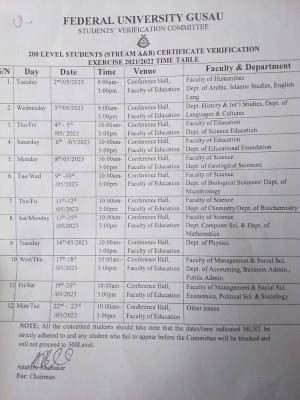
In recent times, there has been a paradigm shift in the conceptualization of Agricultural Education in Nigeria.
It has become all clear that the current habit of releasing Agricultural graduates into the labour market with no practical skills to thrive in existing enterprises or set up their own must be done away with.
In its place must emerge a broad-based, market-oriented curriculum which will teach students not just basic entrepreneurial skills but more advanced skills in marketing, analysis, research and leadership and fully equip them to launch their own enterprises upon graduation and realize their full potential as young, ambitious and talented individuals.
The importance of Agriculture to our national economy is well known. What is less known is that there is a strong correlation between Eeducation and Agricultural development.
Furthermore, Education within the field of Agriculture (in research, extension, farming, and processing) has been linked to high poverty reduction as well as overall economic growth.
This is because with highly skilled agricultural professionals and existing natural resources, a country can easily combat structural inequality and make all the parts of the agricultural machine work, feeding itself, creating jobs, creating income, and formulating export-oriented policies. As agricultural technologies become more advanced, industrial growth will also set in.
To get to this point in Nigeria, a land rich in resources and currently enjoying the perks of a fertile emerging market, Agricultural knowledge must be linked to the market economy. This knowledge must be generated and shared across institutions for the benefit of existing and aspiring professionals. This is what two agricultural scientists Rivera and Davis have called a “workforce education system”.
A workforce educational system prepares graduates to thrive in the labour market by grooming students who know the ins and outs of the system and keep abreast of current trends on the global commodity market. Not only are they knowledgeable about current trends, they also have two personal skills that will serve them well as successful businessmen – leadership, and the ability to take risks and make smart decisions.
In a business climate like Nigeria, business development not only requires start-up capital which might be difficult to raise, but also the willingness to take risks. This latter factor has deterred many from going into agricultural business. Yet it is an indispensable skill to have in business.
For those with the natural propensity to take risks and those who have gained this through training in initiative taking, risk analysis and mitigation, and innovation, the journey to success is already halfway completed.
To get to their summit, these entrepreneurs will need leadership skills (including speaking and marketing skills) to be able to manage a body of people, sustain and grow an organization or enterprise, tap into different markets, form partnerships and alliances, listen to and learn from others, source and build on existing research, grow client bases and effectively manage resources.
To this end, I propose the development of a multifaceted – and multidisciplinary, if you will – market-oriented agricultural programme. While the Masters in Business Administration (MBA) programme has caught on among Nigerians who are looking to become business professionals, and various agricultural schools and departments have courses on agricultural entrepreneurship or economics, it has been very short-sighted of these institutions to fail to develop an Agricultural Business Management (ABM) programme either as an undergraduate or professional programme of study. As the acquisition and application of employable skills is an integral part of the ABM training, this programme emphasizes practical experience in the industry, through industrial attachments, grants, cooperative programmes, fellowships, and internships.
In addition, this programme, which has become very prestigious in some universities abroad, is useful because of the level of skills, exposure to cutting-edge technologies, global trends and commodity markets, lending and financing institutions, best practices, and powerful networks it offers to its students who then take that education and use it to sprout home-market and export-oriented enterprises.
Its absence in our institutions of higher learning has made the difference between the current crop of graduates and the large class of world-class agricultural businessmen we can but do not have, between an ailing agricultural economy and the buoyant economy we should be boasting, between spotty enterprises here and there and a range of large-scale food production, processing and manufacturing industries.
In order to get to the future we want, educational institutions need to start plugging themselves into the larger political and business systems. One of the chief complaints from these institutions has been the lack of adequate finances/allocations to move our educational system forward. Through innovation, some of these challenges can be overcome.
With strategic partnerships in the political economy through important market/private sector and government bodies as well as institutions within and beyond the boundaries of the country, the current offerings in institutions can be revised and upgraded to include an ABM programme which will incorporate one or two semesters of field work in business establishments and a heavy-emphasis on demand-driven knowledge.
With persistent and strategic lobbying with the federal and state ministries of agriculture and education, it is possible for institutions that show a serious interest in this endeavour to acquire funds to develop the programme, expand networks and fuel research. As the reputation of this programme grows through its visible outcomes, it will be scaled up and replicated in other parts of the country.
But at the end of the day, the onus also falls on the government, as it is responsible, through its public policy, for the project of national economic growth and development. It is my hope that this paradigm shift that has begun to occur will be far-reaching generating the political, institutional, pedagogical and individual will to transform our country into the economic tiger it can be.
Submitted by: Jayeola Ridwan, A prospective Student of the Lagos State University (LASU). Published by SchoolGist.

